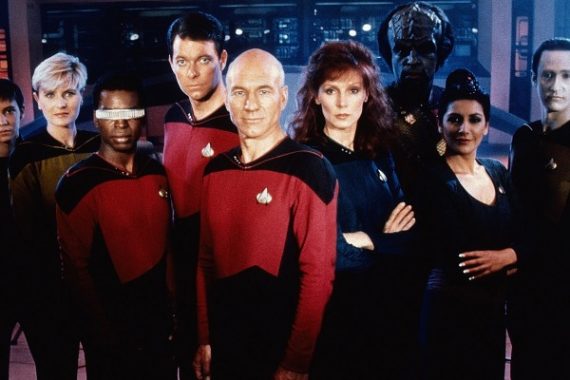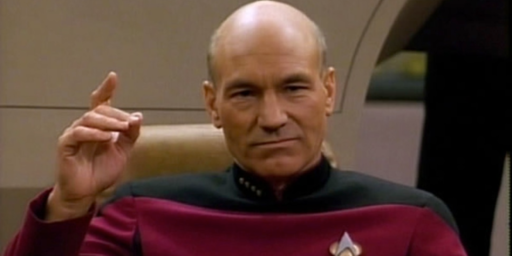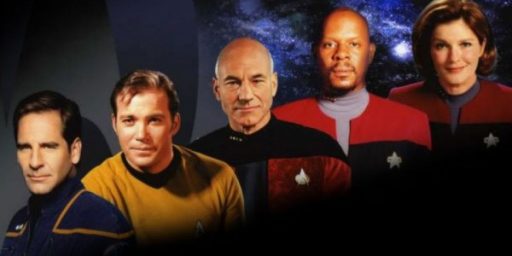Star Trek: The Next Generation Turns 25
So, it's been a quarter of a century since "Star Trek: The Next Generation" made its debut. As if I didn't feel old already.
So, it’s been a quarter of a century since “Star Trek: The Next Generation” made its debut. As if I didn’t feel old already.
Graeme McMillan argues that the show “changed pop culture forever.”
This Friday marks the 25th anniversary of the debut of Star Trek: The Next Generation, the first of many extensions of Gene Roddenberry’s “Wagon Train To The Stars” concept for a television series. Although it’s easy to make fun of the series for its many quirks — it was, after all, a show where everyone wore space-age onesies for the first three years — what’s often overlooked is that, in many ways,Star Trek: The Next Generation turned out to be an eerie predictor of the world we live in today.
I don’t mean that in the traditional sense, where people point out the way in which the show’s futuristic technology — The Holodeck! Geordi’s visor! Warp drive! — has started to work its way into our reality. (And, yes, I know; Star Trek: The Next Generation invented the iPad more than two decades before Steve Jobs. They even called it the PADD, somewhat presciently.) I’d rather focus on the fact that Star Trek: The Next Generation, seemingly by accident, managed to create a model of what pop culture would be like a quarter of a century later — and no one really noticed.
[…]
These days, of course, we’re used to the idea of rebooting series and franchises and getting new takes on what had come before, keeping the best bits and discarding what doesn’t fit for something that everyone hopes is better. That wasn’t the case back in 1987. Back then, translations between media tried their best to faithfully replicate previous iterations, and even oddities like the Dan Aykroyd and Tom Hanks Dragnet movie that predated The Next Generation by a matter of months tried their hardest to offer affectionate homage to their predecessors, even as they pretended to parody them. Star Trek: The Next Generation may not be a reboot in the common usage of the term today: It takes place in the same continuity as the earlier series, and doesn’t seek to replace it or undo anything that came before, but for all intents and purposes it was a reboot for the concept and a chance for Roddenberry and staff to correct whatever mistakes or bad decisions had been forced on the original.
[…]
Not only does modern-day reboot culture have its first blossoming here, but so does procedural culture. Whether intentionally or otherwise, the team behind all things Star Trek successfully managed to turn story into commodity — and, more importantly, have everyone from the creators to the fans, accept this as a really good thing. CSI and Law & Order? You’re welcome.
But modern-day pop culture owes more to Star Trek: The Next Generation than just making the world a safer place for NCIS: Los Angeles. TNG was a massively successful show; when the show finished in 1994, it had become the highest-rated drama in syndicated television, boasting 15 to 20 million viewers a week. This was far beyond anything managed by the original Star Trek — a show that had, after all, been canceled twice in its three-year run. This kind of success took the show far beyond any expectation of “cult” and transcended what was expected of genre television in general. Star Trek: The Next Generation, somehow, made nerd culture mainstream for the first time.
[…]
This may seem less impressive in today’s world filled with Avengers, Dark Knights who Rise and Spider-Men, Amazing or otherwise. Nowadays, nerd culture is pop culture, in many ways. But before Star Trek: The Next Generation, that wasn’t the case. Genre programming had been on the decline since the 1960s, replaced by more action-oriented series for men and soap operas like Dallas andDynasty for women. Even though the fervor for Star Trek faded when that show finished (Deep Space Nine and Voyager both performed well in terms of ratings, but nowhere near the level of The Next Generation, and the less said about Enterprise, the better), nerd culture had broken through and refused to disappear entirely. The X-Files, Buffy, Lost… There’s always been at least one successful, zeitgeist-defining genre show on American television since The Next Generation (today’s, I’d argue, is Doctor Who. An import, sure, but it sets the tone in a way that nothing else really matches on the small screen these days) — something that would have seemed unimaginable before Captain Picard stood up on a weekly basis, tugged on his jersey and told his faithful audience to make it so.
I’d argue that TNG was also a trendsetter in another regard: a precursor to the best written, smartest shows being somewhere other than the Big 3 networks. These days, I watch more shows on AMC than ABC, NBC, and CBS combined. That was unimaginable in 1987.







Not to take anything away from Next Gen, which was an incredible show, but you really can’t give it credit for a lot that can’t ultimately be traced back to the original. Hell, would a syndicated show like it have even been possible without the success of Classic Trek after cancellation?
Mike
James,
Thanks for making me feel old.
The success of the Star Trek franchise is, to quote Spock, “fascinating.” Who could have imagined a somewhat campy mid-1960s sci-fi show that ran for two seasons would spawn five follow-on series (many people say four, but they forget the cartoon) and 11 feature films? I remember watching the original Star Trek in syndication when I was a kid (perhaps I also watched it in first-runs, but as the series and I both premiered in 1966, I would not remember).
I was stationed in Germany when ST:TNG premiered; fortunately, it was also broadcast on the American Forces Network. My wife and I watched it until it ended, as “All Good Things” do. And we’ve watched it again, in syndication, and yet again, on Netflix. It’s a great show that’s held up very well.
Actually, it was three, though a lot of people might argue the third season is best forgotten. I think you can also argue that Yeoman Rand had her own version of the iPad, though we never really got a good look at it.
Make it So….
I gree up watching reruns of TOS in the 70’s and TNG was awesome in the 80’s. TNG and the TOS Movies probably helped keep the franchise alive for much of that time. DS9 and Voyager while not being too bad unfortunately led to Enterprise and the death kneal of any chance of there ever being another series. If only Enterpise could have started with it’s 4th season and moved on to the Earth – Romulan war. Who ever came up with the Xinidi and the temporal cold war plot lines should have been taken out and shot multiple times with a phaser on the stun setting until they forgot about it.
You will be able to buy your kids a replicator for this Christmas. As the technology matures, objects can be “printed” fully assembled, slashing costs, and giving us a future of out of work assembly line robots standing around in line for unemployment, and living on the dole.
The next version of the device will print food. Some version of it will allow you to print the replacement when the original wears out.
It’s not hard to see that what has happened with music and video will happen to any commodity. If I buy the DRM for a pair of Nikes do I own the data or the shoes? How many copies may I make?
About the only thing from Trek we do not have is warp drive. Transporters are less unlikely than in the past, given the experiments done with quantum entanglement In fact, warp drive and transporters are probably a dance together. But not today.
Unlike replicators.
Trek is successful because it keeps us focused on what is relevant, namely, the future.
@Vast Variety:
DS9 was far better than “not too bad,” it was awesome. It was deeper, and often darker, than any of the other series, had a strong story arc from beginning to end, and was very well-written and well-acted. Avery Brooks’ portrayal of Benjamin Sisko was top-notch, as were the performances of Nana Visitor (Kira Nerys) and Rene Auberjonois (Odo).. I see it as the most “intellectual” of the Star Trek series.
One of my favorite things about ST:TNG was how they depicted the evolution of our concept of leadership from the original show.
Captain Kirk would plow forward into everything – clearly in charge – very much like a John Wayne in The Green Berets. Move forward 20 years (Earth time) and you find Captain Picard gathering his staff around a conference table to get other perspectives, yet Picard still carried great authority.
@Mikey: What turned me off of DS9 the most was the whole sub plot with the Prophets. Take that out and I’d be with you on calling it awesome.
@Vast Variety: See, that was one major reason I liked DS9. Non gustibus disputandum, I guess. 🙂
DS9 was the best ST period. Very deep characters, and many of them were recurring- Gul Dukat, Kai Winn(Who I always wished someone, preferably Major Kira, would strangle), Weyoun and others.
Funny thing is- I never watched any of the ST when they first premiered. I caught onto TOS after it went into syndication. TOS went off the air the same year I turned 8. TNG I started watching half way through season 1, DS9 I started viewing when it went into syndication also. Voyager I avoided, probably due to the scathing reviews Tim Lynch wrote of the show. Enterprise I haven’t viewed either but for no particular reason. I did watch the animated series and all but the reboot of the ST movies. Star Trek Nemesis was so horrid in my opinion that I just don’t feel a great urge to see another ST flick.
Netflix has all of ST available via streaming video. I’ve been rewatching DS9 and am currently almost done with season 4.
@Mikey:
I loved DS9 until I saw Babylon 5.
The ending of DS9 left me feeling meh though 🙁
@Stormy Dragon: I loved Babylon 5 too. In fact, my wife and I have met several cast members–Claudia Christian, Jerry Doyle, Peter Jurasik, Jason Carter (a very funny guy), the late Richard Biggs, Patricia Tallman, Andrea Thompson, and–a Star Trek connection–Walter Koenig, who played Bester in B5 and Chekhov in Star Trek.
One of our most treasured possessions is a B5 cast photo, with all of them in full costume…flipping off the camera. And every one we’ve met has signed it. The sad thing is we never got to meet Andreas Katsulas (G’Kar) before he died, so even if we meet everyone else, the picture will never be quite complete.
@Bill:
Jack Nicholson tried that, but all he got out of it was a lobotomy.
@Mikey:
I totally forgot Cuckoo’s Nest. The strangle comment originating from what Baseball author Bill James wrote in 1986 about a fan at a World Series game he labeled ‘That Dreadful Woman’. “That Dreadful Woman, combined the virtues of a coquetteish Southern Belle, the kind that during a Tennessee Williams play you always want to rush onstage and strangle to speed up the plot”. Kai Winn has the same effect everytime she says ‘My Child’. The one most complex character DS9, and I forgot to mention that obvious nominee, is Garek the simple Cardassian tailor.
@Bill: Kai Winn wouldn’t have survived an episode if I’d been able to jump into my TV. At least she came around at the end, although even that kind of ticked me off, because it made her immolation somewhat less enjoyable.
Garak was a wonderful character, one of the reasons DS9 was such a great series.
@Mikey: @Mikey:
Never met a Star Trek personality though once I was seated on a airplane one row behind Rosalind ‘Keiko O’brien’ Chao. That happened in the days(1997-2002) when I was flying to LAX as much as 15 times a year. Was on flights with Broadway Actor Robert Morse who more recently does ‘Mad Men’, Elke Sommer, Lou ‘The Incredible Hulk’ Ferrigno, and Jonathan Winters. One time I was flying home from LAX and a heavyset Black woman sits beside me in 1st class(I was either a gold or platinum FF who got lots of upgrades.) She looked so familiar and I racked my brains for several minutes trying to identify her till a flight attendant said ‘Hello Ms. Carter’. It was Tony award winning actress Nell Carter.
The father of the New York Yankees exec Brian Cashman, John Cashman, passed away about a week ago. John Cashman was well known in NY Harness racing circles and is a member of the Harness racing hall of fame. The funeral for Cashman was Wednesday and it took place at the church I and my wife attend and where my wife works. She knew John Cashman and his wife Nancy.
My Dad was a harness race horse owner and originally he lived on LI and knew Cashman a little. Since I tagged along with my father during summers as he followed how his horses were doing in places like Scioto Downs, Sportsman Park, and The Meadows, I got to meet quite a few big personalities in the sport over the years. Stanley Dancer, Billy Haughton, Carmine Abbotello. The 3rd winningest driver in the sport’s history, Catello ‘Cat Man’ Manzi, is a cousin of mine.
Two sports I love- LPGA golf and harness racing and both get shorted by the media for men’s golf and thoroughbred racing. While I understand to some extent why the LPGA is slighted(But not when there is no PGA golf for a week and the LPGA is playing a major, but the golf media pays the Women’s British Open almost no attention.) for the PGA, I don’t get it for harness vs. thoroughbred racing.
Back on topic- I don’t ever recall talking to a famous or semi famous actor in my life.
@Stormy Dragon: I second that. Despite the obvious lack of a budget the show was incredibly witty after the first season.